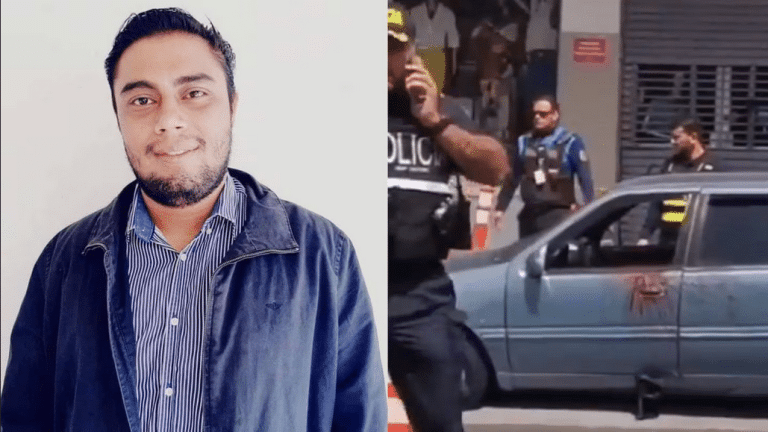16 de enero 2024

Children of Exile: The Births “Sowing Hope” in the Camp of Nicaraguan Farmers

PUBLICIDAD 1M
PUBLICIDAD 4D
PUBLICIDAD 5D
La Nación Editorial: Circumstances of the attempt to assassinate Nicaraguans Joao Maldonado and Nadia Robleto point to political motives

The circumstances of the second attack against Nicaraguan opposition leader Joao Maldonado and his wife, Nadia Robleto, point to political motivations of the assassins.
All the circumstances of the assassination attempt against Nicaraguan opponent Joao Maldonado and his wife, Nadia Robleto, point to the political motivations of the assassins. Maldonado was persecuted by his country’s government after participating in the April 2018 protests and was forced, like so many others, to flee to Costa Rica.
In 2021, he suffered in Escazú, San Jose, a first attempt on his life. He survived by a miracle and the skill of the doctors who attended him. One of five bullets grazed a heart valve, and two others hit his left arm. One lodged in his stomach and the fifth in the clavicle. He spent more than three weeks in the Intensive Care Unit.
The investigations did not clarify the case, but the viewpoint of the local authorities points to their acceptance of the political nature of the attack. Roy Ruiz, the agent in charge of the investigations, said in February of last year that he had “not been able to find the exact motive for the event,” but, far from identifying any other motive, the police provided Maldonado with protection for several months.
“What is yet to be established by the judicial police is whether or not this attack is directly related to the activities or actions taken by Joao Maldonado in opposition to the Ortega regime since he has been a political exile since 2018,” added Ruiz on that occasion, noting it was the most likely hypothesis.
According to Maldonado, in August 2023, agents of the Intelligence and Security Directorate (DIS) visited his home to move him and his entire family to a safe house immediately. They had obtained information about another attack planned.
That second attack occurred last Wednesday, less than five months after the quick flight from the family home. It also took place from a motorcycle, as had happened in 2021, two men shot at Maldonado and his wife, this time on a main street. Both were seriously wounded. He was shot seven times, and she was shot twice.
The office of the United Nations High Commissioner for Refugees (UNHCR) also intervened in Maldonado’s case, and thanks to its efforts, he would have been transferred to the United States for better protection this month. The attack occurred when the Nicaraguan couple left the safe house where they were staying to do an errand related to their daughter’s entry into that country.
La Nación has a copy of the threatening audio messages received via WhatsApp. Maldonado claims to have received calls from Nicaraguan numbers after the first attack. The subjects warned him that they would attack again, and on the second attempt, they would not fail.
There are reasons for the rulers in Managua to have a special dislike for Maldonado. He was a Sandinista National Liberation Front member and worked for the government. He became an opponent at the barricades erected by the residents of Jinotepe, some 60 kilometers from Managua, during one of the worst crises of the regime of Daniel Ortega and Rosario Murillo. His father, Tomas Maldonado, a former Sandinista guerrilla and retired army major, was accused of terrorism, treason, and other crimes. He was released from prison, ill, through an amnesty and died at his home months before the attack on his son in Escazú.
Other Nicaraguan refugees in Costa Rica say they have suffered persecution and threats. Some have managed to convince international organizations of the need to transfer them to other countries, as was about to happen with Maldonado and his family. He expresses no doubt about the origin of the aggressions: “Here there is a base of Daniel Ortega’s government, as far as we have information, of people who were participating in the eighties here, army intelligence, state security, who are currently operating here in Costa Rica,” he said in an interview with La Nación last September 19.
The presidency sent a statement yesterday denying the Intelligence and Security Office visit to Maldonado’s house to move him to a safer place. They further denied the existence of “any kind of indication that in Costa Rica there is any cell organized and controlled by the Nicaraguan government.”
The disinterest of our national security agency in a case like this would be, to say the least, striking. The same can be said of giving little importance to two attacks, fourteen bullets, the testimonies of other refugees, and the relocation efforts of international agencies as “evidence” of the existence of a cell directed against the refugees. On the contrary, the aforementioned elements support the need to investigate the facts with intensity and urgency, not only for humanitarian reasons but also for security and national sovereignty concerns.
This article was originally published in Spanish in Confidencial and translated by Havana Times. To get the most relevant news from our English coverage delivered straight to your inbox, subscribe to The Dispatch.
PUBLICIDAD 3M
Diario costarricense, fundado en 1946. Su primera versión electrónica (nación.com) se publicó en abril de 1995. Desde junio de 2015 implementa un sistema de suscripción digital.
PUBLICIDAD 3D